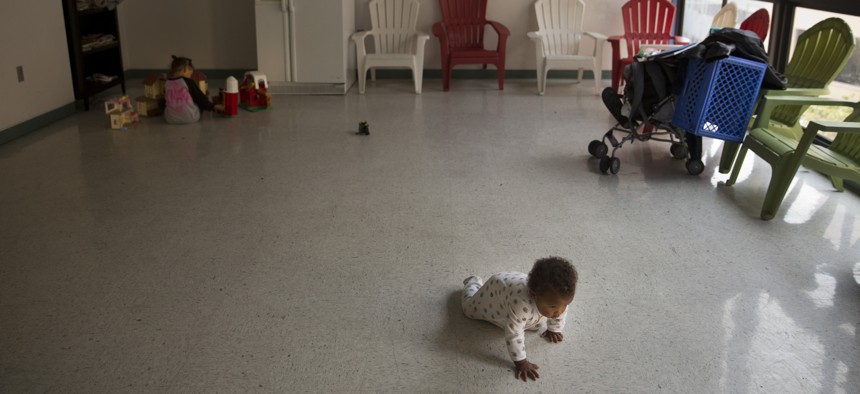Connecting state and local government leaders
The analysis of a grant program that paired supportive services with permanent housing finds that these interventions decrease interactions with the child welfare system.
Families with unstable housing are more likely to interact with the child welfare system. That’s because families who experience homelessness and inadequate housing are particularly vulnerable to struggles with meeting other basic needs as well, including food, healthcare, and childcare.
There’s also an intergenerational component to this problem, said Mary Cunningham, the vice president for metropolitan housing and communities policy at the Urban Institute, a nonpartisan think tank. “Many of the parents who experience instability were foster care kids themselves when they were growing up, so breaking the intergenerational cycle is a challenge,” she said.
But that challenge may not be insurmountable. Since 2012, Cunningham’s team has been studying a federal grant program that sought to address the overlap between housing instability and the need for supportive services, including those in the child welfare system.
The program provided $5 million in five-year grants to each of the five initiatives in Tennessee, Florida, Iowa, Connecticut, and California. Agencies that received grants were then tasked with designing intensive wraparound services that would function in coordination with stable, permanent housing for families that had repeated contact with the child welfare system.
Each site structured their program somewhat differently, with some offering housing vouchers while others used permanent supportive housing units or project-based housing. Cunningham said that all the designs came with their own challenges, but sites had to make it work based on the housing that was available to them. “The sites that did well with vouchers would go with families to help them in their housing search, interact with landlords, and provide extra assistance with security deposits,” she said. “But sometimes in the private market, it can take months to find a house.”
By contrast, programs that used site-based housing could get families in more quickly and were able to provide assistance to all their families in one place. But that, Cunningham said, risks concentrating poverty.
In Tennessee, most families were housed within a month. Kellie Cole, the planning director of the Memphis Community Alliance for the Homeless, whose organization received a grant, said that some families were even able to be housed within a few days. “We had 69 empty units, so we were able to get families in pretty rapidly,” Cole said. “To see people who were homeless with pending child welfare cases, which is just a desperate situation, have things turned around so quickly—that was a beautiful thing.”
Tennessee had their units in five apartment complexes within a two-mile radius, which Cole said made it easier for caseworkers to work with all their clients. They also had an on-site therapist for a few years, and brought programming for the kids straight to them. “It was really all about finding the right combination of services to suit the needs of each family,” she said.
For the study, 807 families were split into control and treatment groups, where each received housing and some services, but the treatment group received extra wraparound services including more caseworker support, move-in help, furniture shopping assistance, parenting education, and counseling services that focused on anger management, substance abuse, mental health, and domestic violence.
The results of the study are mixed, but promising. A year after enrollment, 86% of treatment families across the five sites lived in a place with their own lease and reported fewer housing issues and higher housing satisfaction than control families. Of the four sites that served parents who were trying to reunite with their children, two of the programs showed treatment families were twice as likely to reunite with their children compared with control families. The other two sites showed no significant difference between the control and treatment groups, which the authors of the report said would require further analysis to explain.
Both the Connecticut and Memphis programs showed lower removal rates of children among families with open child welfare cases where the family was still living together.
Across the board, parents in supportive housing reported feeling less stressed and were able to attend parenting classes. Cunningham said that can have a big impact in reducing homelessness and out-of-home placement for children. But the real benefit, she said, was that programs like these break the intergenerational cycle of homelessness and child abuse, which could have long term impacts that we can’t yet measure.
Now, the challenge is to scale. “These programs often reduced the use of the child welfare welfare system, not enough to pay for the program, but enough to offset the cost,” Cunningham said. “That makes them a good investment.”
Following the end of their grant, Tennessee secured funding for continued case management from the state Department of Children’s Services, and has renewable housing funds from the U.S. Housing and Urban Development Department’s Continuum of Care program.
If the program does scale, Cole suggested using scattered housing sites, with no more than 30% of a complex dedicated to people with housing subsidies. “That way, people can get totally integrated in the community,” she said. She also noted that in programs like these, which have five-year trial periods, there should be stronger support for staff turnover, as it “it takes a long time to reach stability, and staff turnover can slow progress.”
Cunningham said that for supportive housing programs to grow, the federal government needs to make a serious financial investment. “To scale this type of program really requires the power and resources of the federal government. But the federal government hasn’t increased the amount of funding to replicate programs like these because affordable housing is so scarce,” she said. “Having sustainable supportive housing could keep families out of the child welfare system entirely. We would have a lot of families waiting in line.”
Emma Coleman is the assistant editor for Route Fifty.

NEXT STORY: This State May Allow Restaurants to Accept Food Stamp Benefits




